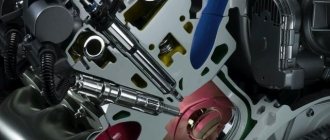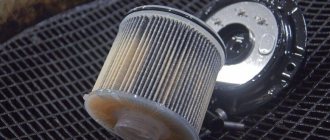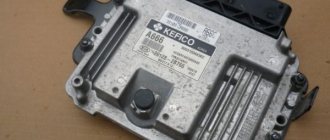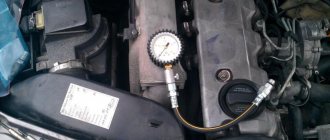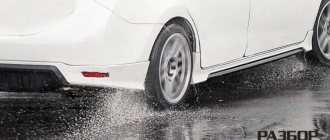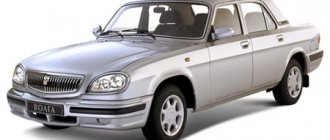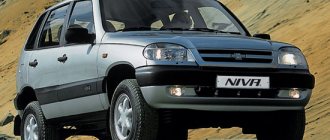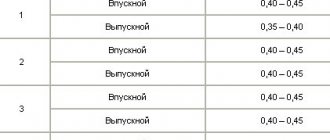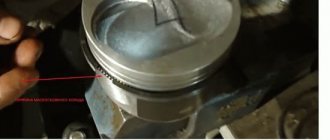Diesel power units are a fundamentally different design than their gasoline counterparts. The key difference lies in the technology used to prepare and ignite the fuel. The formation of the mixture is carried out in the combustion chamber, and the work cycle consists of injecting a dosed portion under enormous pressure, after which it ignites upon contact with heated air. This technology allows you to get rid of the fuel pump, spark plugs, high-voltage wires and other elements necessary for gasoline engines.
Advantages
Diesel fuel power units are characterized by a number of general advantages.
- Economical. The efficiency of such engines is 40% and can reach 50% with a supercharging system.
- Power. When operating diesel engines with a turbine, there is no classic pronounced turbo lag, and all the torque becomes available almost from the lowest revs.
- Reliability. The mileage of diesel power units is up to 700,000 km.
- Environmentally friendly. The use of EGR technology and a significantly lower volume of CO in the exhaust gases can significantly reduce the negative impact on the environment.
Advantages of diesel cars
- Economical consumption
. When a car owner has to travel a lot for work or wants to see the world, then preference should be given to a diesel car. On average, they consume less fuel, which makes transportation costs cheaper. - Gravity.
Engines running on heavy fuel have high torque. They create a large traction force, which is required for transporting goods when driving off-road. Therefore, it is more profitable to buy commercial vans, pickups or SUVs with a diesel engine. - Durability
. In recent years, the quality of diesel engines has improved significantly. Precise dimensions, reliable materials, and durable components make diesel cars tough and durable. Some motors have a service life of around 1 million km. - Demand in the secondary market.
Experts in the sale of used cars have discovered another advantage of diesel engines. They don't fall in price as quickly as gasoline models. And interest in diesel engines on the secondary market remains high. - Safety
. When choosing the type of motor, you should pay attention to safety. Since diesel fuel is less flammable than gasoline, you should not be afraid of a fuel fire under the hood. In addition, the diesel engine does not have high-voltage wires, which also has a positive effect on safety. - Myths and reality
. There are still some myths regarding diesel cars. - Noisiness
. If previously the diesel heart under the hood produced a characteristic loud roar, today the average person cannot determine the type of engine by its sound. Even standing next to the hood, it is difficult to guess the type of fuel being burned. - Black exhaust.
Old cars running on diesel fuel give themselves away with black smoke from the exhaust pipe. Modern cars are equipped with exhaust gas afterburning systems, so it is impossible to visually guess the type of engine. - Cold interior.
In winter, diesel engines take longer to warm up to operating temperature. Therefore, it remains cold inside the car for a long time. To solve this problem, many manufacturers equip cars with autonomous heaters or reheaters. The interior of such cars is always warm in winter.
We recommend: Hydraulic clutch release drive: purpose, design and bleeding
We have selected 22 of the best diesel cars for review. All of them are supplied to the Russian market, and some are also assembled in our country. When allocating places in the ranking, the opinions of authoritative experts and reviews of domestic car enthusiasts were taken into account.
Refueling
One of the features of operating diesel engines of any type is meticulous attention to fuel quality. Experts advise checking even fuel from branded gas stations yourself. The main enemy of a diesel installation is the presence of water in the mixture, which can provoke corrosion in the fuel equipment. To avoid this, it is recommended not to fill the fuel directly into the tank, but to put it in cans and let it settle so that possible sediment and impurities have time to sink to the bottom.
A simple way to check the mixture for the presence of water is to add potassium permanganate crystals to a test portion collected in a transparent container. If there is water around them, colored stains immediately form.
Another important criterion is the absolute transparency of the mixture. Any cloudiness, especially in winter, may indicate the initial stage of crystallization of paraffin, which easily clogs fuel filters.
Service
The specifics of operating diesel engines imply scrupulous compliance with all manufacturer's requirements, any violation of which may ultimately lead to the need for expensive repairs. Recommendations common to all power plants of this type include:
- Timely replacement and quality control of oil. Experts advise carrying out this procedure even more often than the service interval prescribed in the manual. This recommendation is due to the unstable sulfur characteristics of Russian diesel fuel. As a conditional interval, you can focus on a mileage of 7000 km? 7500 km.
- Timely replacement of the timing belt. In this case, it is recommended to follow the same principle as when changing the oil. For many engines, the permissible belt mileage reaches 100,000 km, but it must be taken into account that we are talking about practically sterile conditions, which are fundamentally unattainable on domestic roads. The breakage of a belt that has worn out prematurely always means destruction of the cylinder head, the repair or replacement of which costs a significant amount.
- Monitoring the cleanliness of the fuel system. It is recommended to replace the filter at least every 10,000 km, and to regularly drain the sediment that accumulates in the sump from the filter itself. It is advisable to wash the fuel tank twice a year, removing it from the car. Failure to comply with these requirements may result in failure of the injectors and fuel pump.
How to operate a diesel engine correctly
1) As in a gasoline engine, in a diesel engine it is necessary to promptly change the engine oil and filter. This is the basics. High quality and fresh oil should be changed at reduced intervals. This slightly increases immediate costs, but sharply reduces the prospect of overhauling a diesel engine. The recommended oil change interval is 7-8 thousand km, even if the manufacturer allows a longer interval. Believe me, it is much more profitable for you not to be fooled by bright advertising slogans than to later spend a lot of money on repairing the unit due to the characteristics of our fuel. Our diesel fuel contains slightly more sulfur than European diesel fuel, and this determines a slightly different approach to the quality and frequency of diesel engine maintenance. For a modern diesel unit, it is recommended to use oils of a class no lower than CD according to API or B2 according to ACEA. But information about the viscosity index should be found in the manual for your car. If we talk about universal solutions, then this is 10W40, both synthetic and semi-synthetic. There is a marketing ploy that says that for a diesel engine there must be exactly “diesel” oil, that is, that motor oil on the packaging of which is marked “Disel”. This is a trick, there is no such thing, there is a classification of oils, and it is according to this that you need to choose the oil which is required for your diesel engine. Another question is that synthetic oils are the most resistant to oxidation and oil aging, and in a diesel engine with our fuel this is especially true
2) Control and timely maintenance of the timing belt. The condition of both the timing belt and the timing chain does not affect engine wear, but it greatly affects its unexpected failure, for a long time and at great cost. Failure to carry out timely maintenance for routine replacement of timing drive parts leads to very unpleasant and very expensive procedures. You should clearly understand and remember the replacement interval, and strictly follow them. As a rule, the manufacturer regulates the interval in the range from 60 to 100 thousand kilometers, adding a time interval of 2-3 years. The car owner should make smaller adjustments to the service interval if he operates the car in conditions other than calm ones. Any abnormal load leads to a reduction in the service life of both the unit itself and its components and consumable parts. What happens when the interval is broken and the timing belt or chain breaks? At the moment when the chain or belt stops transmitting torque to the timing mechanism, the crankshaft continues to operate. The pistons continue to move, at least by inertia, and encounter valves that have frozen due to a broken drive. This blow leads, at a minimum, to bending of the valves and now the cylinder head must be overhauled with the replacement of valves, caps and other work. All this puts the car out of action for a long time. And sometimes the consequences are even more tragic and a complete overhaul of the diesel engine is required. Fuel quality and condition of the fuel system.
3) As mentioned above, the fuel that is sold everywhere is mostly of very low quality. Therefore, you should be very careful when choosing a gas station. Collect recommendations and reviews from friends and acquaintances who, like you, are puzzled by the problem of high-quality diesel fuel. Determine the range of acceptable and unacceptable gas stations. Minimize visits to unfamiliar gas stations and reduce the risk of refueling your car with untested fuel. This is somewhat similar to paranoia, but it is better to be on the safe side than to stand very far from home on the highway in the cold. In addition to the fuel itself, be very careful about maintaining the fuel system. The sediment from the fuel filter should be drained as often as possible. It is better to ask how to do this at the specialized car service center where you are serviced. We recommend changing the fuel filter at every oil change. This is again a shortened interval, but this maneuver will allow you to reduce the risk of misunderstandings. You should approach the procedure of flushing the entire fuel line and tank very carefully. Diesel fuel leaves a large amount of deposits and dirt. And such a difficult procedure as flushing the fuel tank clearly shows this. It’s better to wash it free of dirt than later; this dirt will have to be removed by a master mechanic during a major overhaul. In addition, a clean tank and lines mean clean injectors and pump.
4) If the engine refuses to start in minus mode on summer diesel fuel, you should not force it to do this when towing. Such attempts to start the engine can damage the fuel equipment. Summer diesel fuel froze, crystallized, and lost its fluidity. It is not capable of ensuring pumpability and lubrication of the fuel pump. The only correct option in this case is to evacuate the car to a warm bay at the engine shop, drain the summer fuel, fill it with winter fuel, pump the fuel line and start it. It is worth remembering that a serviceable unit running on normal fuel will start without any problems even at minus 20.
5) Pay attention to warming up the engine before driving. All the legends that cars can and should start immediately after starting, regardless of the actual engine temperature, are the vigils of environmentalists. We, motorists, strongly recommend that you take a few minutes and allow the engine to reach temperature, so that both the oil and thermal clearances of engine parts will return to operating mode, and you will in one step reduce the risk of costly repairs of the diesel engine. 6) Avoid high speeds. Just remember - the diesel engine is low-speed. It's created like this. Its task is to pull at the bottom, and gasoline engines must spin up. When, like a diesel engine, lifting up the tachometer needle is like death - this is not what it was created for. The optimal operating range is 1600 – 3,200 Rpm. 7) If your car is not prepared by professionals to overcome water obstacles, do not take risks! Don't try to get through a deep puddle with a battering ram. Structurally, a diesel engine does not have a throttle and water quite easily, bypassing the air filter, enters the combustion chamber and disables it. No one has yet canceled water hammer. A very small amount of water from a puddle in the combustion chamber leads to very expensive engine repairs. Choosing a service station Perhaps this is the key point. A professional car service center that specializes in the repair and maintenance of diesel engines will always be able to advise you on certain nuances of your engine and the car as a whole. Timely and high-quality maintenance will save you from hassle and problems. And if a car service has its own department for the selection and delivery of spare parts, then this is a double win. The presence of such an opportunity dramatically improves both the quality of service and reduces costs. Trust diesel engine repairs only to professionals!
All the legends that cars can and should start immediately after starting, regardless of the actual engine temperature, are the vigils of environmentalists. We, motorists, strongly recommend that you take a few minutes and allow the engine to reach temperature, so that both the oil and thermal clearances of engine parts will return to operating mode, and you will in one step reduce the risk of costly repairs of the diesel engine. 6) Avoid high speeds. Just remember - the diesel engine is low-speed. It's created like this. Its task is to pull at the bottom, and gasoline engines must spin up. When, like a diesel engine, lifting up the tachometer needle is like death - this is not what it was created for. The optimal operating range is 1600 – 3,200 Rpm. 7) If your car is not prepared by professionals to overcome water obstacles, do not take risks! Don't try to get through a deep puddle with a battering ram. Structurally, a diesel engine does not have a throttle and water quite easily, bypassing the air filter, enters the combustion chamber and disables it. No one has yet canceled water hammer. A very small amount of water from a puddle in the combustion chamber leads to very expensive engine repairs. Choosing a service station Perhaps this is the key point. A professional car service center that specializes in the repair and maintenance of diesel engines will always be able to advise you on certain nuances of your engine and the car as a whole. Timely and high-quality maintenance will save you from hassle and problems. And if a car service has its own department for the selection and delivery of spare parts, then this is a double win. The presence of such an opportunity dramatically improves both the quality of service and reduces costs. Trust diesel engine repairs only to professionals!
Riding Features
Warming up and stopping the engine. The issue of cold driving is debatable. The operation of diesel engines allows this possibility, however, it should be taken into account that the thermal clearances at this moment are increased, and the cooled oil, on the contrary, partially loses its lubricating properties, which in combination leads to increased wear of parts. The optimal solution would be to drive at speeds up to 40 km/h with 3rd or 2nd gear engaged. You can turn off a non-turbocharged engine immediately, but a motor equipped with a supercharging system must be given the opportunity to run without load so that the bearings have time to cool and are not covered with a varnish film.
Optimal speed. Power units of this type are low-speed. The habit of “spinning” the engine above 3,500 rpm - 4,000 rpm leads to accelerated wear of the cylinder-piston group and crank mechanism. The optimal range for such engines is, depending on the model, the range from 1600 rpm to 3200 rpm.
Air filter specifics. Diesel units are not equipped with inlet throttling, which, combined with the small volume of the combustion chamber and high suction properties, provokes a water hammer when even a minimal amount of water enters the filter.
Refusal to start with traction. A correctly operating power unit starts normally at an ambient temperature of up to?20°C. If starting is difficult, it is strictly forbidden to try to “pull” the car, as this may damage the timing drive. In addition, a mismatch between the temperature tolerance of the fuel and the temperature outside leads to crystallization of paraffin and the loss of the required fluidity of the fuel. In this case, an attempt to start the engine while in tow will result in dry friction and damage to parts of the power unit.
The best diesel SUVs
Traditionally, real SUVs are equipped with high-torque diesel units. At low revs, powerful torque is created, allowing you to overcome the most difficult sections of the road. Here are the best models with a diesel heart.
BMW X5 30d
The German SUV BMW X5 30d leaves no motorist indifferent. He is both praised and criticized, but this only makes the model’s popularity in Russia grow. First of all, experts pay attention to the 3-liter diesel engine. For our country, the Bavarians limited its power to 249 hp. s., which allows you to pay normal road tax. At the same time, the car’s dynamics are excellent; the car accelerates to the coveted hundred in 7 seconds. In the basic configuration, the manufacturer offers an 8-speed automatic transmission, ABS, a multifunction steering wheel with adjustable angle and length, electric windows, a multimedia system with a 6.5-inch display, climate control and many other options.
Despite the stiff suspension and high fuel consumption, the car becomes the winner of our rating.
Advantages
- dynamics;
- good handling;
- comfortable interior;
- effective sound insulation.
Flaws
- hard suspension.
Audi Q5
Presentable and rich! These are the epithets that come to mind when meeting the German crossover Audi Q5. The model is already well known to Russian motorists; its owners value it for its good off-road qualities and reliable diesel engines. Cars with TDI engines with a power of 150, 163 and 190 hp successfully travel on the roads of the country. With. But maximum driving pleasure is provided by a 3-liter unit paired with an 8-speed TipTronic automatic transmission. Considering all-wheel drive and power of 286 hp. pp., you don’t have to worry about traveling along country and forest roads at any time of the year.
The car is in second place in our rating. Users, along with advantages, note disadvantages such as costly maintenance and poor wipers.
Advantages
- good acceleration dynamics;
- beautiful appearance;
- a wide range of engines;
- high-quality interior trim.
Flaws
- expensive maintenance.
Toyota Land Cruiser Prado
The legendary Japanese SUV Toyota Land Cruiser Prado continues to conquer Russian off-road conditions. Frame design, 177 hp diesel unit. With. (2.8 l), 6 automatic transmission, all-wheel drive - these are the main components for successful off-road conquest. But even on the highway, the car behaves excellently; modern systems such as ABS and exchange rate stabilization are responsible for driving safety. The diesel engine is controlled by Multi Terrain Select, independently selecting one of 5 operating modes depending on road conditions.
We recommend: Diesel engine: design, principle of operation
Domestic motorists praise the Japanese cruiser for its beautiful design, reliability, and long service life of all components. The car failed to take a higher place in the ranking due to expensive maintenance and high fuel consumption.
Advantages
- prestige;
- comfortable interior;
- reliable engine;
- spacious trunk.
Flaws
- expensive maintenance;
- high fuel consumption.
Volkswagen Tiguan
The second generation of Volkswagen Tiguan was presented to the automotive elite in 2015. Externally, the city SUV began to look more solid and presentable. Elongated headlights with lensed optics, chrome elements of the radiator grille, and black roof rails make the car easily recognizable on the road. The German crossover is well equipped; the basic configuration has many useful options. The diesel engine (2.0 l) with a power of 150 hp also does not cause any complaints from experts. With. It is not intended for high-speed driving, but thanks to all-wheel drive it can conquer serious off-road conditions.
Tiguan looks more modest than the leaders of our rating. But the owners note the reliable protection of the body from corrosion, the operation of the engine and gearbox.
Advantages
- economical fuel consumption;
- good maneuverability;
- presentable appearance;
- galvanized body.
Flaws
- headlight adjustment required;
- hard suspension.
Hyundai Santa Fe
Experts recognized the Hyundai Santa Fe as the best Korean premium SUV. The car is perfect for a family with two children. By car you can go on a long journey or use it for visiting. The advantages of a crossover include spaciousness, reliability, presentability and ease of maintenance. The car is equipped with a 2.2 liter diesel engine, automatic transmission, and all-wheel drive. He feels confident not only on asphalt roads, but on forest and meadow paths. Inside the SUV there is luxury and comfort.
The owners are satisfied with the equipment of the Korean car, its reliability and versatility. However, one should not demand from him sporting qualities, as well as conquest of serious off-road conditions.
Advantages
- capacity;
- luxurious salon;
- reliable engine;
- presentable appearance.
Flaws
- does not like aggressive driving;
- difficult to pull out of the mud.
KIA Sorento
Another Korean SUV with a diesel engine made it into our rating. This is the KIA Sorento model, which is also distinguished by its affordable price and good quality. The manufacturer installed a 2.2 liter diesel engine, which provides smooth traction both on the plain and on hills. The power unit is complemented by an 8-speed automatic transmission. All-wheel drive ensures a stable position on the road. True, the car is not intended for serious dirt, as evidenced by the low ground clearance (185 mm). But everything in the cabin looks rich, the trunk is spacious, which emphasizes the family purpose of the car.
While traveling over bumpy roads, the car's shortcomings also became apparent. All irregularities are felt in the cabin; the suspension does not handle bumps and potholes well.
Advantages
- economical fuel consumption;
- comfortable interior;
- elastic motor;
- good handling.
Operation in winter
Operation of diesel engines in the cold is complicated by the need to use appropriate fuel when the temperature drops to 20°C or more (“winter” and “arctic”, respectively). The condition of the injectors and injection pump requires special attention. At this time, experts advise leaving the car overnight in a warm garage to avoid crystallization of paraffins in the combustible mixture. When operating a diesel engine equipped with a turbine, it is very useful to have a turbo timer, which will allow you to maintain the intervals necessary for warming up and cooling.
Repair Tips
Trying to save money on spare parts or maintenance when operating a diesel engine can lead to the need for expensive repairs. Due to significant loads, strict requirements are imposed on the quality of components of this type of power plants. Using cheap spark plugs, chains and other components can turn into a pointless waste of money, as the parts will fail in no time. A similar principle is relevant for the service itself, where repair work is carried out. Hiring unqualified mechanics can result in lost time, money, and even further damage to the engine. Repairing diesel engines requires strict adherence to work regulations and the availability of professional knowledge and equipment for the performers.
Modern diesel engines have proven themselves on the positive side, however, the complex design and demanding nature of such models require qualified service. Diesel is a representative of the largest brands of automotive components, and also offers services for adjustment and repair of fuel equipment of domestic and foreign production. You can select the right diesel engine, as well as view the characteristics and photos of the products in the catalog on the company’s website.
